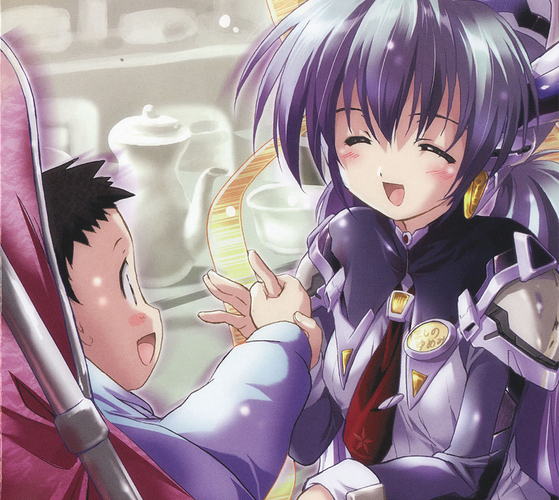For those of you who aren’t aware, I did a musical analysis of each track in the Planetarian - General Discussion and I thought it’d be appropriate to do the same for the side stories, so this post is focusing on how the placement of music represents and emphasises certain themes presented in Snow Globe, and how these can be compared to the original VN. Snow Globe uses fewer tracks than the VN, and some of them aren’t too notable given the context (such as Ame To Robot), so I’ll only be discussing a select few tracks.
Honky Tonk - This piece is used when the mechanic is trying to diagnose Yumemi and figure out why she’s acting like she is. It is believed that she is broken, but no-one can identify the issue that causes her to be broken. In my original post I discussed how the use of the term ‘Honky Tonk’ has several implications in relation to Yumemi’s broken state. One of the things that I mentioned was how it could imply that Yumemi chose to be broken, and while this is in a slightly different context, I think it holds in this case. Yumemi acts like she does because of a promise that she made 10 years before the events of Snow Globe. It is stated that at this time, Yumemi was still learning how to properly process information, and it is because of this why she takes the promise so seriously. This explains why she’s considered ‘broken’ in Snow Globe, but it also ties into the VN. In one of my previous posts, I argue that because of a similar promise made in Snow Globe, Yumemi’s personality doesn’t change in the entirety of the VN, despite the apocalyptic the events that have occurred, and this causes her to be ‘a little bit broken’. So the concept of Yumemi being broken is presented in similar ways in both the VN and Snow Globe, and Honky Tonk is one of the means of expressing those similarities.
Winter’s tale - This plays when Yumemi is doing her introduction talk for the projection. In my original analysis, I stated that Winter’s Tale is used to represent how concepts of faith are seeded into the Junker’s mind, and it holds for this as well, except with the general public. All the people who came to the planetarium came to see Yumemi and hear her talk about the stars. In one of my previous posts, I mentioned how the entire presentation of a projection is similar to a religious ceremony, and that allows this concept of passing on faith to become more prominent. The people attending the projection are presented with Yumemi’s perception of the world - Yumemi’s faith is presented to all these people and puts concepts of hope into their mind, and that’s why a Winter’s Tale is used.
Hoshi No Sekai: This piece plays when the planetariums snow globe is presented at the end, and how it’s welcoming people to a starry world. Normally this piece is used during Yumemi’s ‘Why don’t you come to the planetarium?’ speech, so it being used in a different context is quite notable - but the context it’s used in is very similar. The opening speech with Yumemi is about her inviting people to see the stars, which similar to how the snow globe is described. Given the religious origins of this piece, it follows that this piece is used to represent the idea of offering faith to someone. One thing to also note is how this is the only time this piece is used - Yumemi says her ‘Why don’t you come to the planetarium?’ speech multiple times, but this piece isn’t used during any of those times. That might be because of how this speech is used. In the VN, there are times when this speech is used, but this piece isn’t played. My theory as for why this is the case comes down to the context this speech is used. Both in the VN and Snow Globe, there are times when Yumemi is saying her speech, but it doesn’t seem to be directed at anyone - there isn’t anyone around. In the intro to the VN, she is directing the speech at the people that are passing by. This only emphasises the idea of this piece representing the offering of faith.
Gentle Jena - This plays when Yumemi’s colleagues have to leave her. It’s a very interesting placement of this track because of how one naturally associates this piece. I mentioned in my original analysis how this piece is used to make you remember the planetarium scene, what Yumemi said during that scene and what you felt during that scene. This placement of this piece could be done to provoke emotion in the listener. If you listened to this you most likely already read/saw planetarian, and the planetarium scene is one of the most emotional scenes in it, so just listening to this naturally causes all those feelings to rush back. Basically, the placement of this piece could just be used to make the listener cry. Snow Globe is a story about Yumemi’s colleges, so it is only natural that the writers would want an emotional response from the listener when they’re about to leave Yumemi and potentially die. However I think the use of this piece is more than that. In the VN, Gentle Jena is used to represent how one has complete faith in Yumemi, how one believes in what Yumemi believes in. In this scene, Yumemi’s co-workers are incredibly upset that they have to leave Yumemi - saying that it’s unfair and it shouldn’t be happening. These people love Yumemi, they want to be with her, and thus it would only make sense that they believe in Yumemi’s ideals, so the use of Gentle Jena makes that more apparent.
So despite Snow Globe being a side story, that generally isn’t that important to the overall world of planetarian, it’s still very consistent with the placement of the music when compared to the original VN, and it helps to emphasise many ideas that follow through into the VN.

 Her respect seriously earns a golden takafumi reward.
Her respect seriously earns a golden takafumi reward. as does her stupidity.
as does her stupidity.
